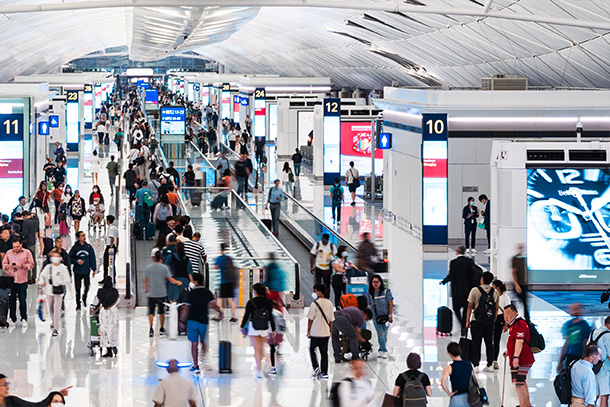
Teams from Penn State’s School of Engineering Design and Innovation (SEDI) placed in several categories at the 2024 University Design Competition for Addressing Airport Needs. Credit: iStock/Kindamorphic.
Penn State engineering teams place in airport design competition
Oct 16, 2024
Editor’s note: A version of this press release originally appeared the National Academies of Sciences, Engineering and Medicine’s website.
UNIVERSITY PARK, Pa. — Teams from Penn State’s School of Engineering Design and Innovation (SEDI) placed in several categories at the 2024 University Design Competition for Addressing Airport Needs. The competition is hosted by the Transportation Research Board’s Airport Cooperative Research Program.
Now in its 18th year, the annual competition encourages students to design innovative and practical solutions to challenges at airports. Winners were chosen from across the four technical challenge areas: Airport Environmental Interactions; Airport Safety, Operations and Maintenance; Passenger Experience and Innovations in Airport Terminal Design; and Airport Management and Planning.
“This design project is a key component of our Engineering Leadership Principles course, where students actively practice leadership as they work toward submitting their designs for competition,” said Meredith Handley, associate director of engineering leadership development (ELD) undergraduate programs and associate teaching professor in the Penn State School of Engineering Design and Innovation. Handley served as the faculty adviser for the Penn State teams. “What makes this experience even more impactful is the involvement of ELD alumni, who serve as mentors throughout the semester. Their guidance goes beyond having taken the course themselves — they provide invaluable leadership insights and technical feedback, enriching the students' learning experience. We are deeply grateful to our alumni for their continued support, which has strengthened this initiative for over a decade.”
Below are the categories in which Penn State teams placed, along with their place, their project names and the names of the Penn State team members, team adviser and team mentors:
Airport Management and Planning Challenge:
First Place
Penn State team project title: Reducing Idle Time via Machine Learning
- Team: Kyle Ketterer, Kaleah Tuttle, Samantha Padamonsky, Owen Hall, Nathan Leo
- Faculty adviser: Meredith Handley
- ELD mentor: Emily Branstetter
Second Place
Penn State team project title: PuriSky Debris Collector
- Team: Rohan Atre, Avery Benfield, Staci Singer, Anshul Ganpule
- Faculty adviser: Meredith Handley
- ELD mentor: Colin Williams
Airport Safety, Operations, and Maintenance Challenge:
Third Place
Penn State team project title: DebriScan
- Team: Aidan Angelopoulos, Arun Vasudevan, Eric Shao, Matthew Kelleher, Sean Brodie
- Faculty adviser: Meredith Handley
- ELD mentor: Braden Heisler
Third Place
Penn State team project title: Unmanned Ground Vehicle for Foreign Object Debris Removal
- Team: Meshari Alqahtani, Andrew Bachner, Noah Brown, Alex Hastie, Ethan Shakour (they took the class in spring 2024)
- Faculty adviser: Meredith Handley
- ELD mentor: Molly Hohner
Passenger Experience and Innovations in Airport Terminal Design
Honorable Mentions:
Penn State team project title: Airport Information Relay System (AIRS)
- Team: Richard Garman, James LaMagna, Carolyn Mowery, Adil Sheikh, Shaivi Tomar
- Faculty adviser: Meredith Handley
- ELD mentor: Braden Heisler
Penn State team project title: Wheelchair Stabilization Platform
- Team: Christina DeAngelo, Coltan Stroble, Emma Gimbel, Dixon Zor, Andrew Arbanas
- Faculty adviser: Meredith Handley
First-place winners received their awards and presented their work at a ceremony at the National Academies of Sciences, Engineering, and Medicine on July 31. They will be given the opportunity to present their winning proposals at an industry professional conference or workshop in fall 2024. Winning teams receive $3,000 for first place, $2,000 for second place, $1,000 for third place and $500 for honorable mentions. The names of all winners and copies of designs receiving place awards can be found here.
The Virginia Space Grant Consortium in Hampton, Virginia, manages the competition on behalf of the Airport Cooperative Research Program. Funding for the competition is provided by the Federal Aviation Administration. Volunteer panels of airport industry and academic practitioners as well as FAA representatives selected the winning submissions from among proposals submitted by 31 student teams.
The Airport Cooperative Research Program is an industry-driven, applied research program that develops near-term, practical solutions to airport challenges. The program is managed by the Transportation Research Board, which is a program unit of the National Academies of Sciences, Engineering, and Medicine — private, nonprofit institutions that provide independent, objective analysis and advice to the nation to solve complex problems and inform public policy decisions related to science, engineering and medicine. The National Academies operate under an 1863 congressional charter to the National Academy of Sciences, signed by President Lincoln. For more information, visit https://national-academies.org.

